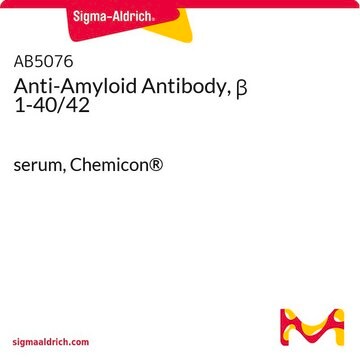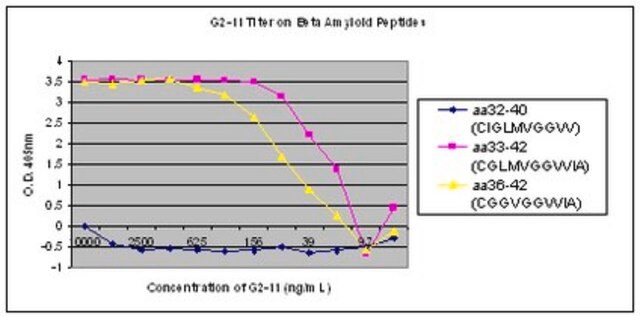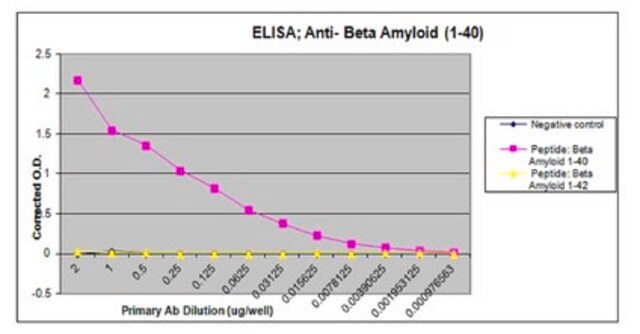The immunogen used to make this antibody corresponding to amino acids 1-40 of beta Amyloid. The antibody reacts specifically with β-amyloid protein. The epitope recognized by the antibody resides within amino acids 1-12 of the β-amyloid protein.
A5213
Anti-β-Amyloid antibody, Mouse monoclonal

clone BAM-10, ascites fluid
Synonyme(s) :
Anti-A-BETA, Anti-Amyloid Beta Precursor Protein
Sélectionner une taille de conditionnement
1 000,00 $
Sélectionner une taille de conditionnement
About This Item
1 000,00 $
Produits recommandés
Source biologique
mouse
Conjugué
unconjugated
Forme d'anticorps
ascites fluid
Type de produit anticorps
primary antibodies
Clone
BAM-10, monoclonal
Contient
15 mM sodium azide
Espèces réactives
human
Validation améliorée
independent
Learn more about Antibody Enhanced Validation
Technique(s)
immunohistochemistry (formalin-fixed, paraffin-embedded sections): 1:2,000 using formic acid-treated, formalin-fixed, human Alzheimer′s disease (AD) brain sections.
indirect ELISA: suitable
Isotype
IgG1
Conditions d'expédition
dry ice
Température de stockage
−20°C
Modification post-traductionnelle de la cible
unmodified
Vous recherchez des produits similaires ? Visite Guide de comparaison des produits
Catégories apparentées
Description générale
Spécificité
Immunogène
Application
Actions biochimiques/physiologiques
Forme physique
Stockage et stabilité
Clause de non-responsabilité
Vous ne trouvez pas le bon produit ?
Essayez notre Outil de sélection de produits.
Produit(s) apparenté(s)
Code de la classe de stockage
10 - Combustible liquids
Classe de danger pour l'eau (WGK)
nwg
Point d'éclair (°F)
Not applicable
Point d'éclair (°C)
Not applicable
Faites votre choix parmi les versions les plus récentes :
Certificats d'analyse (COA)
Vous ne trouvez pas la bonne version ?
Si vous avez besoin d'une version particulière, vous pouvez rechercher un certificat spécifique par le numéro de lot.
Déjà en possession de ce produit ?
Retrouvez la documentation relative aux produits que vous avez récemment achetés dans la Bibliothèque de documents.
Les clients ont également consulté
-
Please let us know the specificity of this antibody for Anti-beta Amyloid 1-40 or 1-41 or 1-42?
1 answer-
Helpful?
-
Active Filters
Notre équipe de scientifiques dispose d'une expérience dans tous les secteurs de la recherche, notamment en sciences de la vie, science des matériaux, synthèse chimique, chromatographie, analyse et dans de nombreux autres domaines..
Contacter notre Service technique









